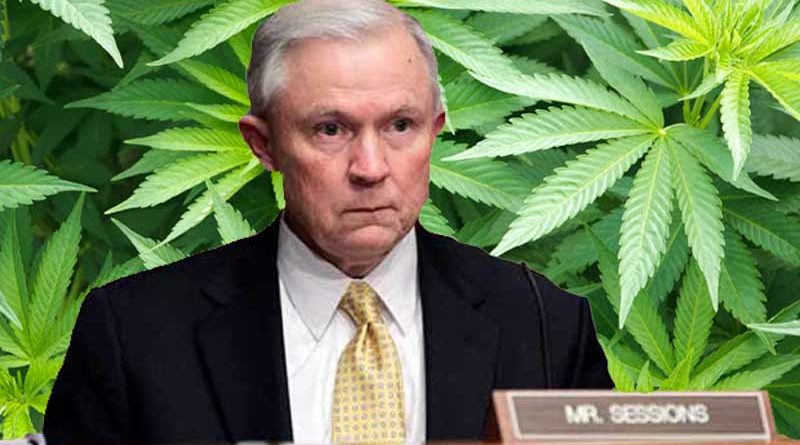
Last month, United States Attorney General Jeff Sessions sent a letter to congressional leaders urging them to oppose Congress again including in Department of Justice appropriations legislation a provision intended to stop, through a restriction on the use of appropriated money, the US government from arresting and prosecuting people for actions that comply with state medical marijuana laws, even if those actions violate US drug laws. Some people are reacting to Sessions’ letter, which was revealed this week, with condemnation of Sessions and the Trump administration for departing from Obama administration policy that showed increased leniency in regard to marijuana. But this claim appears to misrepresent the Obama administration’s marijuana history.
Tom Angell, who revealed the Sessions letter in a Monday article at MassRoots, suggests that Sessions’ request is consistent with the position under the Obama administration given that President Barack Obama, in his last two budget requests, suggested Congress remove the medical marijuana language. Indeed, Sessions pretty much makes this same observation that he is continuing the prior administration’s policy in the first sentence of his letter to Senate Majority Leader Mitch McConnell (R-KY), Senate Minority Leader Charles E. Schumer (D-NY), House or Representatives Speaker Paul Ryan (R-WI), and House Minority Leader Nancy Pelosi (D-CA). Sessions starts the letter as follows: “I write to renew the Department of Justice’s opposition to the inclusion of language in any appropriations legislation that would prohibit the use of Department of Justice funds or in any way inhibit its authority to enforce the Controlled Substances Act (CSA).”
Further, Obama administration Justice Department lawyers, after the appropriations provision was in effect, defended in the Ninth US Circuit Court of Appeals case of United States v. McIntosh ignoring, in ten separate drug law cases that had been consolidated for review on appeal, whether defendants complied with state medical marijuana laws. In each case, the individuals were being prosecuted for actions that they argued complied with state medical marijuana laws. The Obama administration lost the argument in the appellate court, with the court deciding in August of 2016 that the appropriations provision “prohibits DOJ from spending funds from relevant appropriations acts for the prosecution of individuals who engage in conduct permitted by the State Medical Marijuana Laws and who fully complied with such laws.” The court decision, in addition, ordered that, if the US government should decide to proceed with prosecution of any appellants, those appellants “are entitled to evidentiary hearings to determine whether their conduct was completely authorized by state law.”
While the Ninth Circuit decision interprets the medical marijuana appropriations provision as providing protection for people complying with state medical marijuana laws, that decision does not help people who live in the states outside that judicial circuit. Also, as I noted in an article shortly after the McIntosh decision was announced, the DOJ argument for a reading of the appropriations language that would mean the provision provides little to no protection from prosecution is rather persuasive and could be accepted by other courts. The appropriations provision also provides no hope for protection for anyone anywhere who is dealing with recreational instead of medical marijuana or for anyone living in one of the states that has not liberalized medical marijuana laws.
Though the Obama administration backed off some in prosecutions of individuals acting in compliance with state laws concerning marijuana that over the past few years have been increasingly liberalized, that did not mean that the Obama administration wanted to subject itself to any additional restraints imposed by the legislative branch. Instead, the Obama administration preferred to design its own restraints via Department of Justice memoranda. These memoranda culminated in the August 29, 2013 Cole memorandum that directs DOJ lawyers to limit their prosecutions of people who are complying with liberalized state medical and recreational marijuana laws. But, the Cole memorandum also provides several exceptions that prosecutors can use to justify cases against individuals who are complying with state laws. In addition, the Cole memorandum and other Justice Department memoranda are just advisory for government employees (unlike a statute that could be enforceable as law to the benefit of defendants) and can be revoked or amended by subsequent DOJ memos.
Sessions has indicated a general support for the Cole memorandum’s policies, stating the following in a March 15 questions and answers with reporters: “The Cole memorandum set up some policies under President Obama’s Department of Justice about how cases should be selected in those states and what would be appropriate for federal prosecution, much of which I think is valid.” Yet, there is no guarantee that the wiggle room the Cole memorandum provides for prosecutions will be used the same in the Trump administration as it was in the Obama administration or that the DOJ will not come out with a new memorandum that keeps much of the Cole memorandum policies while also creating significant changes in DOJ policies related to people complying with state marijuana laws.
If you want to ensure people who grow, sell, use, or otherwise deal with marijuana are not arrested, prosecuted, and imprisoned by the US government, then both the appropriations medical marijuana provision and the Cole memorandum fall far short of accomplishing the goal. What is needed is for Congress to pass legislation ending the war on marijuana. Leave marijuana laws to the states. Just walk away from the war.
States are steadily developing a patchwork quilt of differing marijuana laws, with full prohibition becoming increasingly rare. Meanwhile, the majority of Americans favor legal recreational marijuana, and significantly more favor legal medical marijuana. The US government’s war on marijuana is increasingly becoming the odd man out. Despite the evident lack of will among congressional leaders to challenge the war on marijuana, increasing pressure, contributed to by changes in state and local governments’ law as well as public opinion, may soon succeed in emboldening Congress so it will approve legislation that ends the US government’s war on marijuana.

